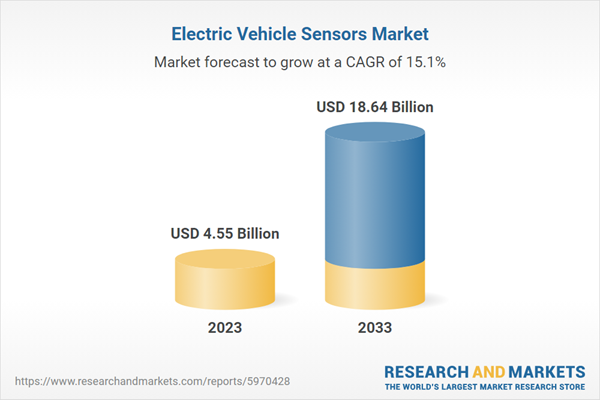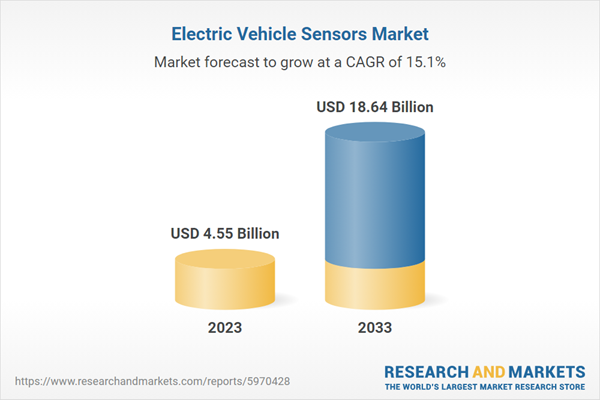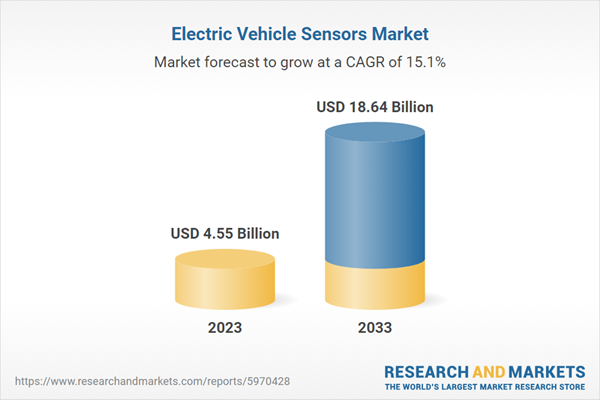Global and Regional Electric Vehicle Sensors Industry Research 2024: A $18.64 Billion Market by 2033

Electric Vehicle Sensors Market


Dublin, May 20, 2024 (GLOBE NEWSWIRE) — The “Electric Vehicle Sensors Market – A Global and Regional Analysis: Focus on Vehicle Type, Power Source, Sensor Type, Point of Sale, and Country-Level Analysis – Analysis and Forecast, 2023-2033” report has been added to ResearchAndMarkets.com’s offering.
The electric vehicle sensors market was valued at $4.55 billion in 2023, and it is expected to grow at a CAGR of 15.14% and reach $18.64 billion by 2033. This market is shaped by the increasing adoption of electric vehicles and the growing demand for autonomous vehicles. Conversely, challenges such as regulatory discrepancies, global uncertainties, economic instability, and infrastructural limitations pose hurdles to growth.
Electric Vehicles (EVs) leverage a complex sensor network to deliver operational efficiency, advanced safety, and market-differentiating features. This sensor technology is pivotal for intelligent battery management, optimizing range and longevity through real-time monitoring. Moreover, sensors protect critical EV components such as motors and inverters, ensuring both performance and long-term asset value.


The integration of ADAS, empowered by sensors such as LiDAR and radar, unlocks a new level of safety while laying the groundwork for autonomous capabilities. The EV market’s exponential growth underscores the necessity for continued investment in sensor technologies, which will drive enhanced efficiency, reliability, and consumer-centric innovation.
The electric vehicle sensors market is experiencing considerable growth in the Asia-Pacific region, propelled by the accelerated adoption of electric vehicles in economically advanced nations such as China, Japan, and South Korea. The International Energy Agency (IEA) reports that, for FY2022, China was responsible for approximately 60% of all new global car registrations, underlining its significant contribution to the sector’s expansion. Additionally, the Asia-Pacific area serves as a hub for numerous EV manufacturers such as BYD, SAIC, Nio, Nissan, Hyundai, and Toyota, further boosting the market’s dynamics.
Countries on the rise, including India and Malaysia, are also demonstrating considerable strides in the electric vehicle sensors market, backed by robust government initiatives to foster the use of renewable energy. This surge is bolstering the sector’s overall growth, indicating a positive trajectory for the adoption of sustainable transportation solutions.
Market Introduction
The electric vehicle sensors market is undergoing remarkable expansion, fueled by the swift uptake of electric vehicles on a global scale. Sensors play a crucial role in ensuring the functionality and safety of EVs, meticulously overseeing battery performance powertrain components, and facilitating advanced driver assistance systems (ADAS) that are revolutionizing the driving experience.
The increasing demand for extended driving range, enhanced safety measures, and the evolution toward autonomous driving technologies are driving innovation and capital investment in EV sensor technology. Projections for the market anticipate sustained growth as sensor capabilities continue to advance, thereby optimizing EV efficiency and reliability, and enhancing user-centric features.
Industrial Impacts
Given the increasing demand for electric vehicles and the growing market for advanced automotive electronics, the demand for EV sensors is expected to continue to rise. However, concerns about semiconductor shortage, the Russia-Ukraine war, and the need for sustainable materials for manufacturing sensors are prompting research and development efforts aimed at improving the efficiency and environmental performance of EV sensor production processes, as well as exploring alternative sources of materials for its manufacture.
The key players operating in the electric vehicle sensors market include Allegro MicroSystems, Inc., Amphenol Advanced Sensors, ams Osram AG, Analog Devices, Inc., Denso Corporation, Infineon Technologies AG, Kohshin Electric Corporation, LEM, Zebra Technologies, Inc., NXP Semiconductors, Renesas Electronics Corporation, Melexis. STMicroelectronics, Vishay Intertechnology, Inc., Texas Instruments Incorporated, and among others. These companies are focusing on strategic partnerships and product launches to expand their market presence.
Passenger Vehicles to Dominate the Electric Vehicle Sensors Market (by Vehicle Type)
As the global electric vehicle sensors market shifts toward sustainability, the demand for passenger vehicles is expected to surge. This is largely due to sensors’ critical role in bolstering vehicle safety and performance. A significant increase in consumer preference for safety-first vehicles has strengthened the necessity for sensors in electric cars.
Furthermore, consumers’ growing affluence is driving the demand for electric vehicles that boast advanced features and superior safety measures, propelling the growth of passenger vehicles in the market. Additionally, continuous advancements in sensor technology are boosting the driving experience, contributing to the electric vehicle industry’s robust and sustainable growth by making cars more reliable, efficient, and user-friendly.
Battery Electric Vehicles to Dominate in the Electric Vehicle Sensors Market (by Power Source)
Battery electric vehicles (BEVs) are set to dominate the electric vehicle sensors market, a trend driven by their reliance on electric powertrains. This reliance necessitates a comprehensive range of sensors to ensure the battery’s health, temperature, and energy efficiency are constantly monitored and managed. Unlike hybrid systems, BEVs’ simplicity in technology means there’s less mechanical complexity but a greater need for precise and dependable sensor data to maintain optimal performance and safety.
With sustainability becoming a key consumer priority, the demand for BEVs is experiencing a surge, which is propelling advancements in sensor technology. These advancements are crucial for improving vehicle diagnostics, performance, and user experience. A key example of this dynamic is the evolution of battery management systems (BMS), essential for BEVs. BMSs are bolstering their reliance on sensors to execute vital tasks, including the monitoring of cell voltage and temperature, thereby boosting the growth of robust sensor technologies in the automotive sector.
Current/Voltage Sensors to Dominate in the Electric Vehicle Sensors Market (by Sensors Type)
Current/voltage sensors are leading the electric vehicle sensors market due to their crucial function in maintaining efficient and safe operations of electric vehicles (EVs). These sensors are instrumental in overseeing the electrical system’s integrity, enabling the battery management system to accurately determine the battery’s state of charge and health.
Such detailed monitoring is vital for enhancing the vehicle’s range, performance, and durability. Specifically, for battery electric vehicles (BEVs), these sensors provide real-time insights into an electrical flow, boosting the capability to promptly identify any anomalies that might suggest problems, such as battery wear or short circuits. This role is propelling the growth of the EV sensors market, bolstering the technology’s adoption due to its robust contribution to vehicle reliability and longevity.
OEM to be Dominant in the Electric Vehicle Sensors Market (by Point of Sale)
The dominance of original equipment manufacturers (OEMs) in the electric vehicle sensors market is expected to surge, primarily driven by their critical involvement in the early stages of sensor integration into EVs. This position enables OEMs to ensure that these essential components match the vehicle’s precise needs and specifications flawlessly.
By controlling the design and manufacturing processes, OEMs can seamlessly embed advanced sensor technologies into the vehicle’s framework. This integration not only boosts the vehicle’s performance but also strengthens its safety features from the start, propelling robust growth in the electric vehicle sensors market.
Key Attributes:
|
Report Attribute |
Details |
|
No. of Pages |
268 |
|
Forecast Period |
2023 – 2033 |
|
Estimated Market Value (USD) in 2023 |
$4.55 Billion |
|
Forecasted Market Value (USD) by 2033 |
$18.64 Billion |
|
Compound Annual Growth Rate |
15.1% |
Market Dynamics: Overview
Market Drivers
-
Surging Electric Vehicle Sales
-
Increasing Demand for Sensors Due to 5G Adoption in Electric Vehicles
-
Increasing Push from Government and Consumers to Develop Safety Features for Vehicles
Trends: Current and Future Impact Assessment
Market Restraints
Market Opportunities
Supply Chain Overview
-
Value Chain Analysis
-
Market Map
-
Pricing Forecast
Research and Development Review
Regulatory Landscape
Startup Funding Summary
Electric Vehicle Sensors Market (by Vehicle Type)
-
Passenger Vehicles
-
Commercial Vehicles
Electric Vehicle Sensors Market (by Power Source)
-
Battery Electric Vehicles (BEVs)
-
Hybrid Electric Vehicles (HEVs)
-
Plug-In Electric Vehicles (PHEVs)
Electric Vehicle Sensors Market (by Sensor Type)
Temperature Sensors
-
Electric Vehicle Battery
-
Electric Motors
-
Others
Current/Voltage Sensors
-
Electric Vehicle Battery
-
Electric Motors
-
Others
Pressure Sensors
Position Sensors
Electric Vehicle Sensors Market (by Point of Sale)
Aftermarket (by Vehicle Type)
-
Passenger Vehicles
-
Commercial Vehicles
Aftermarket (by Power Source)
Companies Featured
-
Allegro MicroSystems, Inc.
-
Amphenol Advanced Sensors
-
ams Osram AG
-
Analog Devices, Inc.
-
Denso Corporation
-
Infineon Technologies AG
-
Kohshin Electric Corporation
-
LEM
-
Zebra Technologies, Inc.
-
NXP Semiconductors
-
Renesas Electronics Corporation
-
Melexis
-
STMicroelectronics
-
Vishay Intertechnology, Inc.
-
Texas Instruments Incorporated
For more information about this report visit https://www.researchandmarkets.com/r/cj640y
About ResearchAndMarkets.com
ResearchAndMarkets.com is the world’s leading source for international market research reports and market data. We provide you with the latest data on international and regional markets, key industries, the top companies, new products and the latest trends.
Attachment
CONTACT: CONTACT: ResearchAndMarkets.com Laura Wood,Senior Press Manager press@researchandmarkets.com For E.S.T Office Hours Call 1-917-300-0470 For U.S./ CAN Toll Free Call 1-800-526-8630 For GMT Office Hours Call +353-1-416-8900





